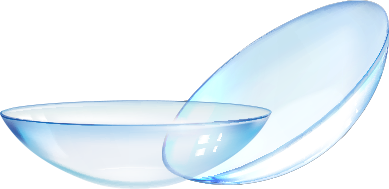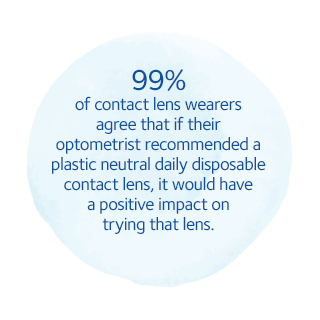
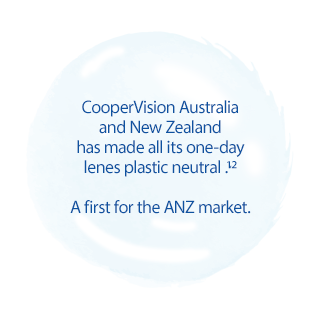
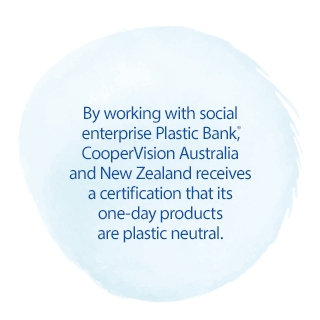
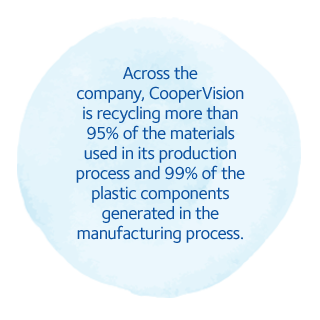
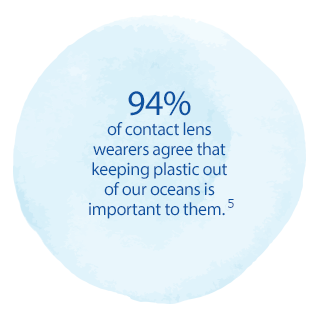
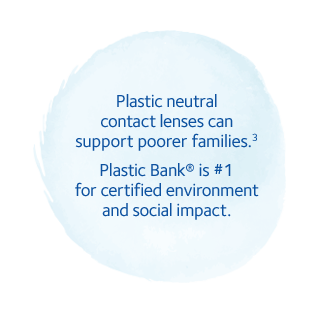
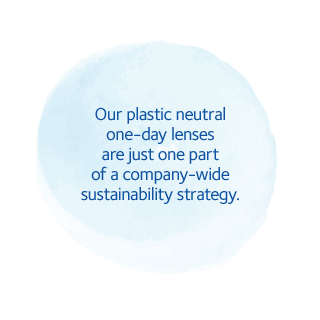
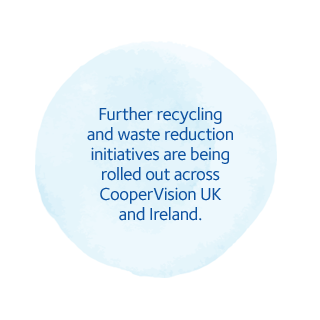




























The full range1 of CooperVision contact lens brands in Australia and New Zealand are now plastic neutral2.
We’ve partnered with Plastic Bank® to collect and recycle ocean-bound plastic. We purchase credits equal to the weight of the plastic we use in our range1 of contact lenses, the blister and secondary packaging (outer carton) here in Australia and New Zealand – and an equal amount of ocean-bound plastic is collected by Plastic Bank®.2

“With this partnership with Plastic Bank, we’re really excited that we have introduced the world's first plastic neutral contact lens.
It's about every eye care professional, every consumer out there that says yes that makes the change”
It's about every eye care professional, every consumer out there that says yes that makes the change”
Dan McBride
President of CooperVision and Executive Vice President of The Cooper Companies.
President of CooperVision and Executive Vice President of The Cooper Companies.
IMPACT DASHBOARD
“For CooperVision, plastic neutrality is about making a meaningful, measurable difference in partnership with eye care professionals and wearers. By simply prescribing and wearing our plastic neutral lenses, they’re making an impact. With our Dashboard, everyone can see for themselves how these contributions quickly add up. It displays the eye-opening amount of ocean-bound plastic we’ve recovered to date and the local communities we’ve empowered—working together,”
Simon Seshadri,
Senior Vice President, Global Marketing, CooperVision.
CooperVision - The more you see, the more you care »
Senior Vice President, Global Marketing, CooperVision.
CooperVision - The more you see, the more you care »
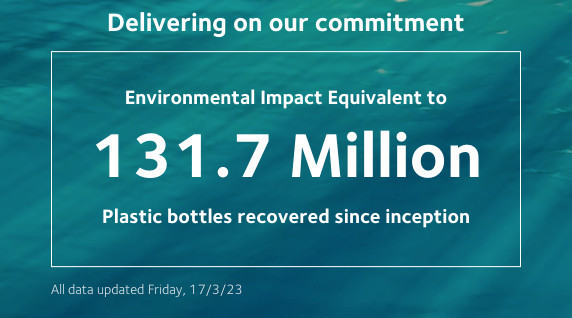
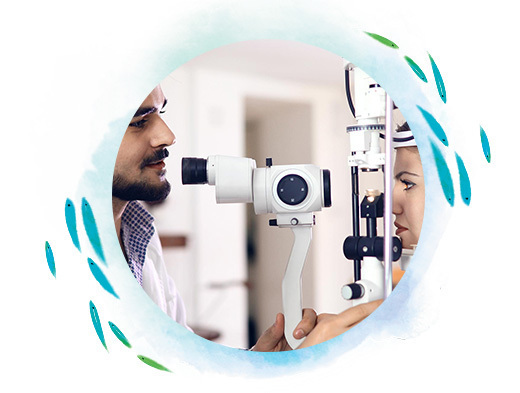
Plastic is essential in healthcare delivery.
Plastics are used throughout healthcare for a number of important reasons, including sterility and safety.3,4 And contact lenses and their packaging are no different – plastic has an important role to play.
Sustainability matters to all of us.
Sustainability is important and we all care about how plastic is managed. 94% of contact lens wearers agree that keeping plastic out of the ocean is important to them.5

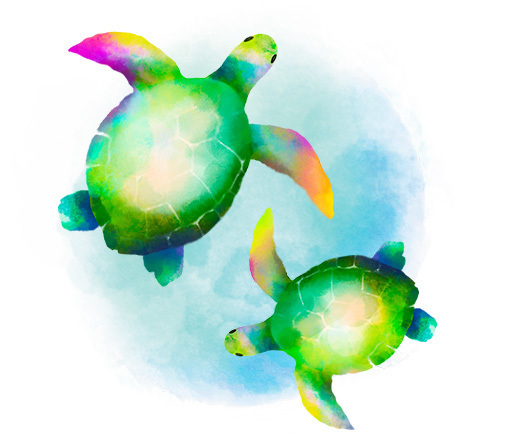
Sustainability at CooperVision.
Like many companies, we’re on a sustainability journey – and we’ve made some significant steps so far.
Our facilities in Costa Rica, Puerto Rico and Madrid, Spain are LEED certified (Leadership in Energy & Environmental Design) and we have BREEAM (Building Research Establishment Environmental Assessment Method) certification at our Mountpark facility in the UK.
We’re aligned to the UN Sustainable Development Goals, with Responsible Consumption and Production being a priority goal for us.
We’re aligned to the UN Sustainable Development Goals, with Responsible Consumption and Production being a priority goal for us.
Expanding our plastic neutral commitment.
The full range1 of CooperVision contact lens brands in Australia and New Zealand are now plastic neutral2.
- Plastic neutral is achieved when a company (or an individual) recovers and recycles the same amount of plastic it uses or produces.6
- Achieving plastic neutrality is a meaningful action we can take today while we work on longer-term innovation.
Our plastic neutral story in just over a minute.
Our plastic neutral contact lens families.
All CooperVision contact lens brands and products in Australia and New Zealand are plastic neutral.
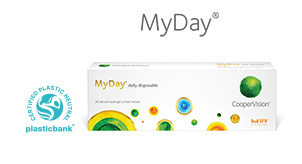
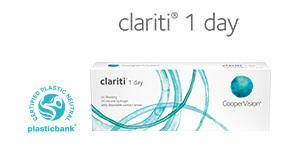
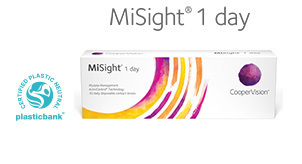
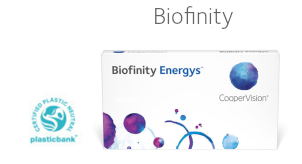
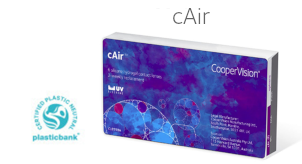
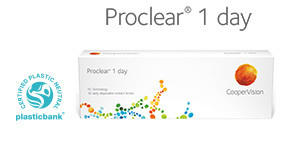

CooperVision is also the manufacturer of Ascend, Softview and Liberty contact lenses which are also plastic neutral. Speak with your optometrist for more information.
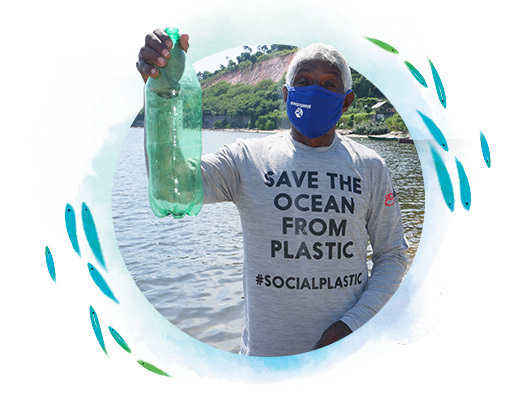
Partnership for environmental and social good.
We’ve partnered with Plastic Bank® – a social enterprise that builds on ethical recycling ecosystems in coastal communities.7
- Plastic is collected by those in the community and those collectors receive a premium for the material they collect, which helps them provide basic family necessities such as groceries, cooking fuel, school tuition and health insurance.7
- Collected materials are reborn and reprocessed for reintroduction into the supply chain.7

Plastic neutral contact lenses.
How it works.
- The entire range1 of CooperVision contact lens brands and products in Australia and New Zealand are included.
- All plastic used in the lens, the blister and the secondary packaging (outer carton) including ink, adhesive and films is added up.
- We purchase credits equal to the weight of plastic we use in our contact lenses, the blister and the secondary packaging here in Australia and New Zealand.2
- An equal amount of ocean-bound plastic is collected by Plastic Bank®.


Plastic neutral contact lenses.
How to get involved
as a contact lens wearer.
- As all CooperVision contact lens brands and products in Australia and New Zealand are plastic neutral, all you have to do is talk to your Eye Care Professional about wanting to try a plastic neutral contact lens.
- Your optometrist will discuss your vision needs and make a recommendation.
- • It’s simple! There is no enrolment process for you to undertake – by wearing plastic neutral contact lenses you are participating.

Prescribing plastic neutral contact lenses.
How to get involved
as an Eye Care Professional.
- As all CooperVision contact lens brands and products in Australia and New Zealand are plastic neutral, all you have to do is recommend one of those brands to your patients and you will be prescribing plastic neutral.
- Your wearers will be pleased to hear your recommendation – 80% of contact lens wearers would choose a plastic neutral contact lens over a comparable non-plastic neutral lens, assuming both were recommended by their Eye Care Professional.5
- It’s simple! There is no enrolment process for Eye Care Professionals or consumers – anyone who recommends or wears the lens is participating.
Like to know more?
Contact lens wearers:
If you’d like to find out more about plastic neutral contact lenses, talk to your optometrist.
Eye Care Professionals:
If you’d like to find out more about plastic neutral contact lenses, contact your CooperVision representative who will be happy to tell you all about them!
Download the clinical study:
Download our clinical study into disposal of, and recycling options for contact lenses.
1. Range defined as all 1 day, 2-weekly and monthly replacement contact lens brands and segments: sphere, toric and multifocal sold and distributed by CooperVision in Australia and New Zealand.
2. Plastic neutrality is established by purchasing credits from Plastic Bank. A credit represents the collection and conversion of one kilogram of plastic that may reach or be destined for waterways. CooperVision purchases credits equal to the weight of plastic in our 1 day, 2-weekly and monthly replacement contact lens orders in a specified time period. Contact lens plastic is determined by the weight of plastic in the blister, the lens and the secondary (outer carton) package, including laminates, adhesives, and auxiliary inputs (e.g. ink).
3. Plastics Industry Association. Why is medical plastic packaging so essential? Accessed January 5, 2021. https://thisisplastics.com/safety/why-are-medical-plastic-packages-so-essential/
4. https://www.mpo-mag.com/contents/view_online-exclusives/2017-10-09/5-ways-plastics-revolutionized-the-healthcare-industry/
5. CooperVision data on file, 2021. Plastic Neutrality Survey 302 consumers aged 16-65 years, Decision Analyst October 2021 in Australia
6. The PEW Charitable Trusts and SYSTEMIQ. Breaking the plastic wave: a comprehensive assessment of pathways towards stopping ocean plastic pollution. July 23, 2020. Accessed December 21, 2020.
7. About Plastic Bank. Assessed April 8, 2022; https://plasticbank.com/.
CooperVision soft daily disposable contact lenses for vision correction. This product may not be right for you, refer to your optometrist for advice. Always read the label and follow the instructions for use (https://coopervision.co.nz/patientinstruction)
2. Plastic neutrality is established by purchasing credits from Plastic Bank. A credit represents the collection and conversion of one kilogram of plastic that may reach or be destined for waterways. CooperVision purchases credits equal to the weight of plastic in our 1 day, 2-weekly and monthly replacement contact lens orders in a specified time period. Contact lens plastic is determined by the weight of plastic in the blister, the lens and the secondary (outer carton) package, including laminates, adhesives, and auxiliary inputs (e.g. ink).
3. Plastics Industry Association. Why is medical plastic packaging so essential? Accessed January 5, 2021. https://thisisplastics.com/safety/why-are-medical-plastic-packages-so-essential/
4. https://www.mpo-mag.com/contents/view_online-exclusives/2017-10-09/5-ways-plastics-revolutionized-the-healthcare-industry/
5. CooperVision data on file, 2021. Plastic Neutrality Survey 302 consumers aged 16-65 years, Decision Analyst October 2021 in Australia
6. The PEW Charitable Trusts and SYSTEMIQ. Breaking the plastic wave: a comprehensive assessment of pathways towards stopping ocean plastic pollution. July 23, 2020. Accessed December 21, 2020.
7. About Plastic Bank. Assessed April 8, 2022; https://plasticbank.com/.
CooperVision soft daily disposable contact lenses for vision correction. This product may not be right for you, refer to your optometrist for advice. Always read the label and follow the instructions for use (https://coopervision.co.nz/patientinstruction)








